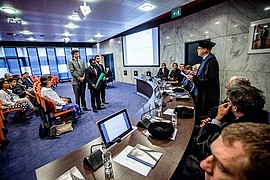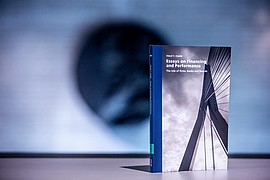PhD Defence: Philip Tadelle Fliers

In his dissertation ‘Essays on financing and performance: the role of firms, banks and boards, ERIM’s Philip Tadelle Fliers combines studies in economic history with contemporary research in corporate finance, in three studies.
Philip Tadelle Fliers defended his dissertation in the Senate Hall at Erasmus University Rotterdam on Friday, 17 June 2016, at 9:30. His supervisor was Prof.dr. A. de Jong and his co-supervisor was Prof.dr. P. G. J. Roosenboom. Other members of the Doctoral Committee were Prof.dr. J. D. Turner (Queen’s University Belfast), Prof.dr. D. Schoenmaker (RSM), and Prof.dr. W.B. Wagner (RSM).
About Philip Tadelle Fliers

Philip Fliers was born in Addis Abeba (Ethiopia) on December 15th, 1986. He holds a BSc degree in Business and Economics, BA degree in Philosophy and an MSc degree in Financial Economics from the Erasmus University Rotterdam. In 2011 he joined the department of Finance of the Rotterdam School of Management, Erasmus University. As a lecturer he was involved in many courses in M&A, valuation, financial analysis and supervised many graduate students.
Thesis Abstract

The way firms and their boards interact with their shareholders or financiers is a difficult balancing act. How firms, banks and board fulfil their role has a significant impact on corporate financing decisions and performance. In three studies, this dissertation combines studies in economic history with contemporary research in corporate finance. The first study investigate the determinants of this bank distress in the Netherlands during the 1920s. During this period the Dutch economy suffered an unequalled financial crisis. This study finds that during this time, banks that acquired too much leverage and attracted large quantities of deposits were more likely to fail. More so the investigation showed that international activities increased bankruptcy risk and that board characteristics, such as interlocking directorates, were important determinants of failure probabilities. The second study takes a more long-run perspective and examines the relation between individual Dutch board members and the outcome of corporate policies such as dividends, investments and capital structures over the entire twentieth century. The study shows that individual Dutch directors have significant impact on corporate policies and performance, their contribution explains between four and eleven percent of the cross-sectional variation in various key metrics over the century. Moreover the study identifies individuals with substantial contributions to corporate performance and provides a historical understanding of the effects these individuals have on corporate policies. Results suggest that the impact of big linkers is primarily due to their social capital and their extensive management experience. The third study investigates the impact of corporate financial flexibility on dividend smoothing practices. First, the study documents that firms smooth their dividends more when they are more financially flexible. Second, the examination shows that firms smooth their dividends more when agency costs are high and that corporate capital structure choices absorb shocks to net income and enables dividend smoothing. The empirical results of these studies highlight each in their own manner the role of firms, banks and boards.
· View and download Philip's dissertation
Photos: Chris Gorzeman / Capital Images


